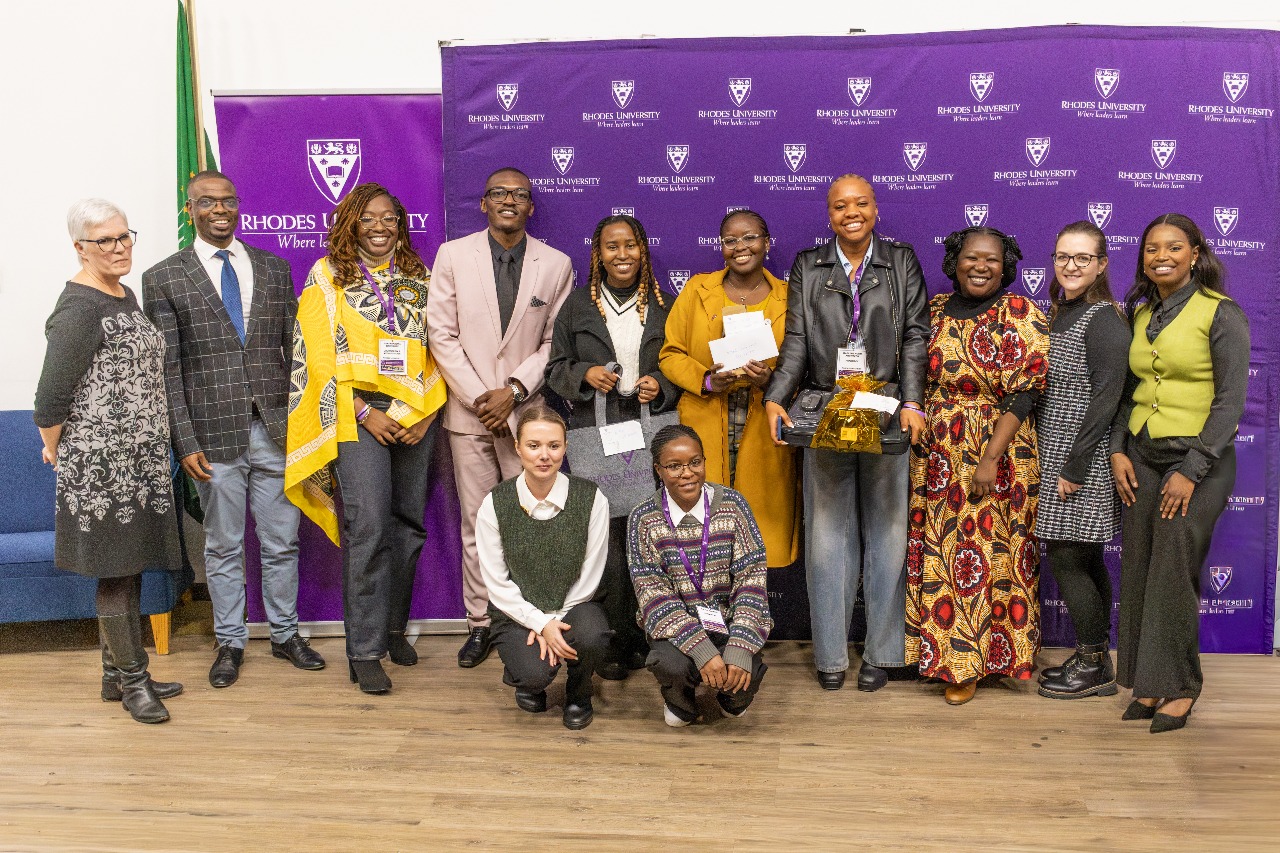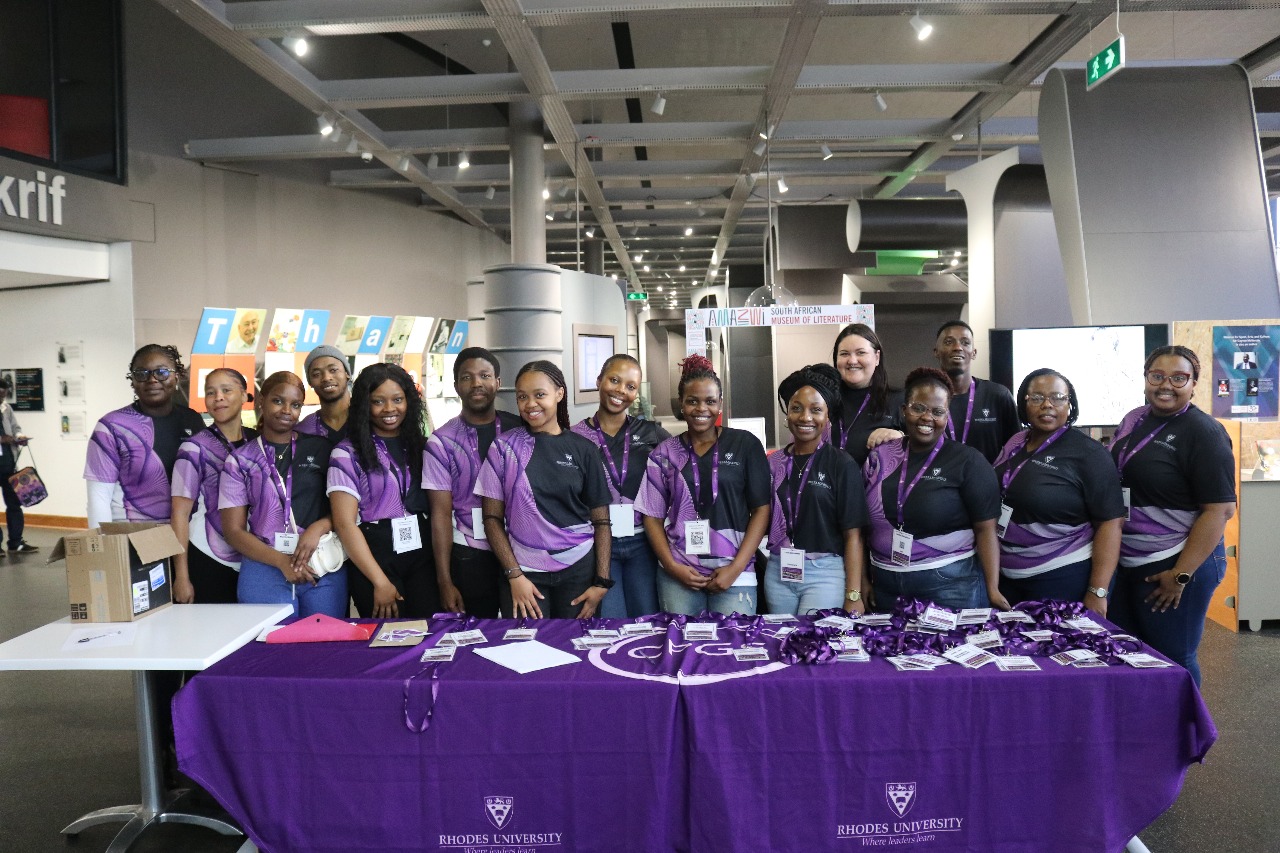
By: Athenkosi Mndende
Rhodes University’s Centre for Postgraduate Studies (CPGS) ushered in two days of vibrant intellectual exchange during its annual postgraduate and postdoctoral conference on 12–13 September 2025. This year’s theme, “Reimagining Research Futures Ten Years After #MustFall – Local and Global Shifts,” sparked rich dialogue and reflection on the enduring legacy of the #MustFall movements. A decade later, participants revisited their transformative impact on research, equity, and knowledge production while engaging with evolving global political landscapes. The conference underscored the strategic imperative to pursue inclusive, responsive, and socially impactful research, ensuring that the lessons of #MustFall continue to shape scholarship both locally and globally.
The day began with Deputy Vice-Chancellor for Academic and Student Affairs, Professor Mabokang Monnapula-Mapesela, officially welcoming participants to the conference and sharing her reflections. She was followed by former directors of the Centre for Postgraduate Studies, Professors Heila Lotz-Sisitka and Sioux McKenna, who highlighted the Centre’s remarkable growth as a testament to its founding vision: challenging dominant knowledges, reimagining institutions, and fostering a supportive community for postgraduate researchers. Professor McKenna emphasised that cultivating such a community has been central to student success, providing academic guidance and a sense of belonging that sustains researchers through the challenges of postgraduate study.
This year’s conference attracted over 300 attendees from universities across the Eastern Cape, marking the largest turnout since inception. Distinguished guests included Deputy Vice-Chancellor for Academic and Student Affairs, Professor ’Mabokang Monnapula-Mapesela; Deputy Vice-Chancellor for Research, Innovation and Strategic Partnerships, Dr Nomakwezi Mzilikazi; keynote speakers; representatives from the Global Exchange Office; members of the Postgraduate Liaison Committee and the Postdoctoral Forum; as well as staff and mentors who provide invaluable support across the Eastern Cape.
In a stirring keynote, former student activist, political exile, and acclaimed author, Mr Majakathata Mokwena—whose works include The Shadow King, Muddlethrough Economics, My Brother’s Keeper, and Letters to My Countrymen—captivated the audience as he reflected on the ongoing struggle for equity, justice, and transformative societal change. Travelling from Lesotho, Mr Mokwena reminded the audience that the struggles fought during apartheid remain unresolved, with a new generation now confronting challenges like #FeesMustFall. He challenged researchers to interrogate why critical scholarship is often overlooked, scrutinise institutional failures, and pursue solutions that strengthen education, public services, and societal equity.
Responding with poise, Nompumelelo Babeli, a doctoral candidate exploring women’s agency in shaping South Africa’s post-apartheid foreign policy, urged the audience to confront history provocatively: “What have we done to honour those who came before us?” Her reflection resonated deeply, inspiring participants to examine their role in creating a more just and equitable society.
The day continued with memorable presentations sparking dialogue across critical themes: centering African knowledge and languages, navigating the promises and risks of AI, addressing justice and equity in fractured societies, and reimagining climate and sustainable futures through locally driven, community-focused approaches.
Day two opened with Deputy Vice-Chancellor Dr Nomakwezi Mzilikazi’s reflection on #MustFall a decade later, describing it as bewildering and necessary for challenging dominant academic narratives. “#MustFall urged us to center African knowledge, dismantle systemic exclusion, and reimagine the purpose of universities—calls that remain as urgent today as they were ten years ago,” she affirmed.
For the first time in the conference’s history, the second keynote was a book launch. Rhodes’ own master’s student, Lazarus Kgageng, widely recognised for his community and youth development work through the Thola Lesedi Foundation (founded in 2016), launched his debut novel, The Chords of Hymn, published in March 2025. This searing fictional narrative addresses gender-based violence, queer identity, parental expectations, and survival, highlighting how mothers and children often bear the brunt of abuse. In the novel, Sechaba’s mother, for instance, is forced into a financially advantageous marriage that leads to years of violence and isolation.
Responding to the novel, Dr Ouma Melvin-Odero, a postdoctoral fellow at the School of Languages and Literatures, whose research explores language, sexuality, and health communication in African contexts, offered a thoughtful reflection. Drawing on her perspective as a Kenyan scholar—where same-sex relationships remain taboo—she emphasised that researchers must look beyond sexuality and preference, approaching issues like gender-based violence and family dysfunction through the lens of shared humanity: “We are humans first.”
Transitioning from the book launch to the conference presentations, day two featured the fiercely competitive Three Minute Thesis (#3MT). Ten participants captivated the audience using a static slide, with adjudicators assessing clarity, engagement, and delivery. The following top prizes were awarded:
3MT Awards
- First position (and prize): Deborah Akintola – “Keys for Plants”
- Second position (and prize): Marlene Ngum – “Spices for Diabetes”
- Third position (and prize): Lungelihle Dlamini – “Turning Trash into Science Magic”
- Best 3MT presentation based on audience vote: Deborah Akintola – “Keys for Plants”
In addition to the 3MT, the conference recognised the best abstracts/presentations, celebrating excellence across universities such as Walter Sisulu University, the University of Fort Hare, Nelson Mandela University, and Rhodes University. Among the top ten, the top five overall abstracts/presentations were:
- Mia Hattingh – Zoology and Entomology Honours, Rhodes University
- Paulo Maseko – Chemistry PhD, Rhodes University
- Tsebang Matlapeng – Chemistry PhD, Rhodes University
- Daniella Recchia – Chemistry, Nelson Mandela University
- Noxolo Manyati – Journalism and Media Studies Master's, Rhodes University
The Overall Best Abstract/Presentation and the Best Rhodian Abstract/Presentation were awarded to Mia Hattingh, an Honours student in the Department of Zoology and Entomology at Rhodes University.
In closing, CPGS Director Prof. Sybert Mutereko reflected on a recurring theme: the imperative for research to be relevant, inclusive, critical, creative, and transformative. He expressed heartfelt gratitude to the keynote speakers, convenors, reviewers, judges, organisers, and support teams for making the event a resounding success.

